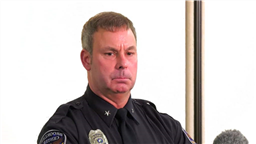ABC News’ Dan Harris joins Arianna Huffington in a new podcast episode of “What I’ve Learned, with Arianna Huffington.”
Huffington, the founder and CEO of Thrive Global, launched her podcast after the world marked one year of the coronavirus pandemic.
“Over the past year, the world has gone through profound changes. And we’ve changed along with it. It’s been a year of unimaginable loss, but also a time of reflection and discovery,” Huffington said in a press release.
In the new episode, Harris talks about the power of self-compassion and life during the pandemic.
“The No. 1 lesson for me over the past year has been incorporating the idea of self compassion into my life,” Harris said on the podcast.
Editor's Picks
Take it from ABC News Correspondent Dan Harris: 'Find what you love and go after it'
This 12-year-old genius has her sights set on becoming a NASA engineer
A Goodwill employee finds $42,000 in a pile of donations
Huffington’s podcast includes episodes with people in music, technology, sports and news as they talk about what they’ve learned over the past year.
Some of her guests include Jay Shetty, Lindsey Vonn, Adam Grant and Bozoma Saint John.
Read an excerpt from the podcast below
Arianna Huffington: I know as the mother of two daughters, I constantly try to protect them and constantly fail, so thank you for the reminder. And another phrase of yours that I love Dan is our inner weather. So first of all, how is your inner weather right now? And, how do you take the temperature of your inner weather?
Dan Harris: Generally speaking, my inner weather’s pretty damn good, especially given that I am not immune to the sort of mid-pandemic blues that I think a lot of people are feeling that, you know, we’ve come far, but we may yet have far to go. And, being in the news, I see a lot of the, sort of more difficult aspects of our culture, and I’m not immune to that either. But generally speaking, this self-compassion on top of the self-awareness that I’ve been working on for years through meditation is a really nice pairing. And, you know, I think you tried to get me to answer a little bit of this earlier that this is not something that I’m just kind of pulling out of a hat, there’s a lot of science here that strongly suggests that people who are more self-compassionate are better able to stick to their goals long-term. They have more other compassion towards other people. They’re happier. There’s all sorts of physiological and even behavioral impacts of this practice. And I like to think of it as a kind of an upward virtuous cycle that when your inner weather is balmy, then your relationships improve.
And of course since relationships are probably the most important contributor to human flourishing, then your inner weather gets even nicer as a consequence of your improved relationships and upwards we go. And this isn’t always — it’s not always going to be like this, I mean, I often pick the opposite spiral, that toilet vortex of, you know, just getting into self isolation and other stuff. But it’s possible for me more frequently to go on the upward spiral and, and that’s a life-enhancing skill.
Arianna Huffington: Yes, and at Thrive we talk a lot about micro steps, you know, tiny, incremental, daily habits that can affect whether you’re in an upward spiral or down the toilet vortex. Have you picked any micro steps, any small habits that help you course-correct if you experience yourself going down the downward spiral?
Dan Harris: I mean, this is where what you referenced earlier is so important, that having self-compassion while endeavoring to work on self-compassion is so key. I’ll give you one really, really helpful example. So for me, I can get into a whole yakety-yak situation around eating and body image. People get surprised sometimes when they hear me say this, first of all, it’s not a thing that men talk about that much.
Second, I’m slim, but I am on TV. So I kind of see myself frequently. I’m nearing 50. And so sometimes I look in the mirror and realize, wow, I don’t look the way I used to. It would take an archeological dig to find the abs I had in my 30s. And so, yeah, I can get into a whole situation around that.
I also can get it maybe a little dysregulated around after-dinner cookies, and then that messes up my sleep. And then the whole next day, I don’t feel good, and so I can get into cycles around that. And actually two things. One is, can I treat the misstep, maybe it was eating too much cookies or maybe it was spending too much time looking critically in a mirror.
Can I treat that as a data point? Rather than a failure. What did I learn? What was going on last night that I had too many cookies, disrupted my sleep and now I feel crappy? So that’s one thing. And the second thing is, as a scientist, named Chris Germer, who was one of the leading scientists in the field of self-compassion said to me recently, the fundamental question of self-compassion is, ‘What do I need right now?’ And so can I ask that little question? What do I need right now? Is it endless rounds of self isolation or is it a nap?
Arianna Huffington: I love that, that’s beautiful, and really in a sense, it’s connected with everything you’ve taught for so many years around meditation because, you made meditation so much more approachable by breaking it down into these tiny, incremental steps by encouraging people to start wherever they are. So how does self-compassion help these inner skills of meditation?
Dan Harris: Well, because if you think about meditation, and there are lots of forms of meditation, but the beginning form of mindfulness meditation has you sitting or lying down comfortably?
How often do you close your eyes, then you try to bring your full attention to the feeling of your breath coming in and going out? And then every time you get distracted, which will happen a million times, you start again and again, and again. That moment of waking up from distraction is often an opportunity for, you know, beating yourself up and feeling humiliated because you’re so distractible.
And by the way, the things you were thinking while you were distracted are so embarrassing and often venal and homicidal and whatever. And so you can really get into feeling like crap in that moment. If you can have a self-compassionate attitude of like, ‘Oh, can I treat this as a data point?’ Can I just see how wild my mind is and realize that, ‘Oh yeah, actually the point of meditation isn’t to stop thinking, it’s to see the inner cacophony clearly so that it doesn’t own me anymore.’
Well, that’s really helpful. Can I just give myself a break, stop striving for perfection all the time, because that attitude, that type-A attitude can be really helpful in some areas of our lives, not so much in meditation. And so can I be OK with the inherent sloppiness of the practice?
You can listen to the podcast now on Audible, Spotify, Apple Podcasts, iHeartRadio, and everywhere you listen to your favorite podcasts.
Source: Read Full Article


